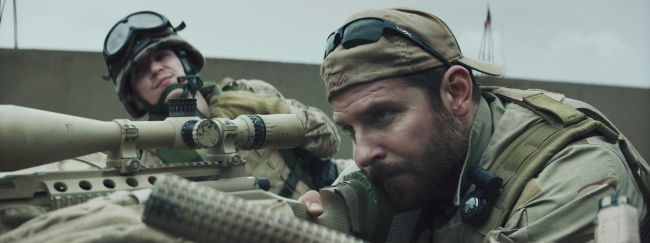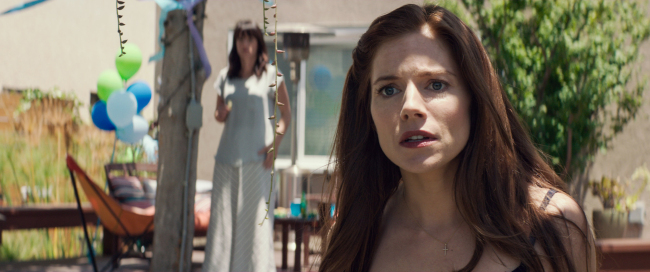The acting drops away from Bradley Cooper’s performance as “deadliest American sniper” Chris Kyle. Cooper bulked up, kept a pinch between his lower lip and jaw and became a man of few drawled words, the perfect Clint Eastwood hero in Eastwood’s film “American Sniper.”
The director, who has seemed distracted if not downright bored with his recent films ― “Jersey Boys” was sort of a post-orangutan low ― returns to form with a clean kill of a movie, an unfussy combat film that only drifts in a third act. And that drift only sets in because the director decided to err on the side of trying to do justice to the real hero’s life.
 |
Kyle Gallner (left) as Goat-Winston and Bradley Cooper as Chris Kyle in “American Sniper” (Warner Bros. Pictures/TNS) |
Kyle grew up in rural Texas, absorbing his daddy’s simple, black and white values. The world, Daddy (Ben Reed) taught him, is full of sheep, wolves and sheep dogs. He wasn’t raising sheep, and wouldn’t stand for his boys becoming bullies or predators (wolves). Since there’s “evil in this world,” his boys need to be “sheep dogs.”
That explains the reaction Chris had when American embassies were bombed in 1998. His moral code has him abandon the cowboy lifestyle and enlist in the Navy. Because that’s where the SEALS are.
By the time 9/11 rolls around, he’s already a top sharp shooter. Eastwood’s film follows Kyle from his first kill, through multiple tours in Iraq, a guy his own troops call “The Legend,” a man with a high Iraqi insurgent bounty on his head.
“American Sniper” tells this story not just from Kyle’s point of view, but through it. He is not shooting insurgents ― snipers, bomb-makers and “savages,” as he calls the enemy. He is “protecting” Marines as they deploy on house-to-house searches, giving up his secure sniper’s perch to bust down doors and show the green troops how to stay safe and do the job on later tours.
 |
Sienna Miller as Taya in “American Sniper” Warner Bros. (Pictures/TNS) |
First scene to last, Cooper keeps Kyle buttoned down, a man of such moral certitude that he’s prepared “to answer for each and every kill to the Almighty” when his time is up. The war turns personal when an opposing sniper starts picking off Americans. But Kyle tries to keep his cool and works hard to keep his bride (Sienna Miller) sheltered from the dangerous and deadly details of the job.
An excellent early scene ― Kyle flirts with that future bride in a bar during SEAL training. Miller’s Taya is quick with a brush-off. The swaggering SEALS are “arrogant and self-centered.” Kyle keeps his cool, seems to accept the dismissal. But “self-centered” he will not take.
“I’d lay down my life for my country.”
Too much of “American Sniper” is standard-issue military service movie, from the abusive training sequences to the standard operating procedure of house searches, dusty firefights and bodies dropped like a rising score in a first-person-shooter video game. No characters outside of Cooper and Miller make much of an impression.
Eastwood allows for a few grace notes in between the war movie cliches ― the brother (Keir O’Donnell) who also enlisted and is first to weary of America’s longest war, the hint that Kyle’s crack-shot counterpart (Sammy Sheik) lives a life parallel to Kyle’s, that of the lonely hunter-family man.
The director has a reverence for his subject that goes beyond covering the usual bases such as a SEAL funeral, suggesting the cost even a guy as sure of himself and what he is doing as Kyle pays an emotional toll for this bloody work.
And that reverence trips Eastwood up as he looks for his own exit strategy, a way of getting into and out of a third act that isn’t as simple or neat as a “clean kill.”
But Cooper, to his credit, rarely flinches, never chest-thumps and never loses his cool, even when Kyle is starting to lose his. It’s a masterful interpretation of a man with a lot more on his mind and blood on his hands than he was ever inclined to let on. And it’s a performance worthy of Eastwood himself ― 50 years ago.
By Roger Moore
(Tribune News Service)
(Tribune Content Agency)









